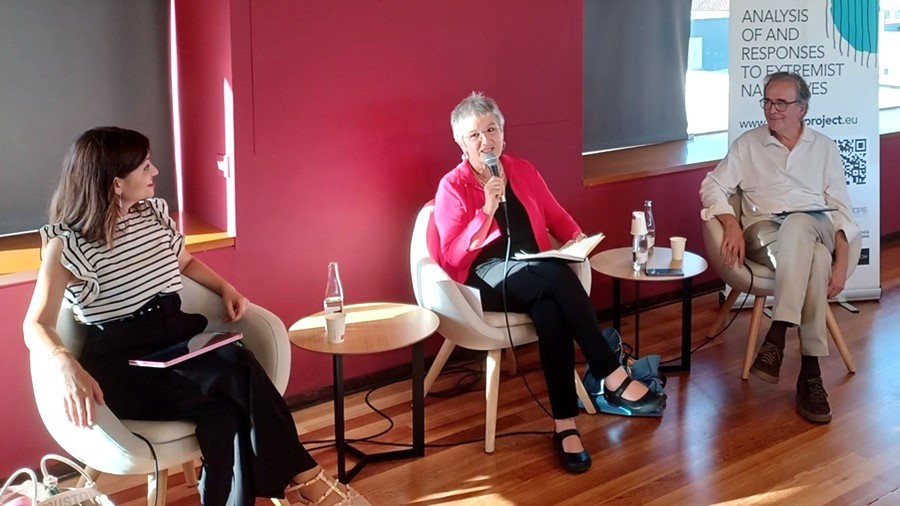UAB congress focuses on current threats to democracies in Europe
Sira Rego, Minister for Youth and Children; Milagros Pérez Oliva, journalist with El País; and Joan Subirats, UAB professor in political science and former minister for Universities, participated in the inaugural round table of the international congress on threats to current democracies in Europe: "Going Extreme. Història, narratives i l'amenaça per a les democràcies a Europa". The congress was organised by the UAB Centre in Studies on Dictatorships and Democracies (CEDID) and took place until 27 September in the Centre de Cultura Contemporània de Barcelona (CCCB).

The three speakers discussed the causes and characteristics of the rise of the far right in Western societies, a topic addressed by the ARENAS project (Analysis of and Responses to Extremist Narratives), funded by the Horizon Europe programme, within which the conference was held. The principal investigator of the project, which involves researchers from various European academic institutions, is Steven Forti, lecturer in the Department of Modern and Early Modern History at the UAB and researcher at the CEDID-UAB.
One of the most worrying aspects of the issue is the proliferation of radical-right positions among youth, as reflected in numerous studies and polls that Pérez Oliva cited in her first speech. According to Minister Rego, the problem is that “there is, for the first time, a whole generation that is uncertain about its future”. In this sense, Subirats regretted that, unlike other generations like her own, today's youth do not see that their efforts: educational training, becoming competent professionals, etc. can “end up meaning something”. For political scientist Joan Subirats, the great danger of current capitalism lies precisely in inequality, and he reflected that public administration should perhaps assume the key importance of diversity in today's societies, as it sometimes “confuses equality with homogeneity”.
Minister Rego expressed her opposition to the idea that young people are disaffected with politics. According to the minister, young people are indeed politicised, but it must be assumed that “the channel is already another one”, thus opening the subject of the importance of social networks and the capacities of the far right in this field. In the face of uncertainty, she affirmed that “the reactionary project knows how to respond in a simple” and, at the same time, “terrifying way, because it leaves millions of people on the sidelines”. Joan Subirats added that “the far right vindicates traditional roles as something clear and structured”, which allows them to confront uncertainty and the rise of feminism on their terms. As Minister Rego said, “fourth wave feminism is very dangerous for them because it questions everything, including the productive sphere, the care system”., and so on.
A "rebellious" right
Moreover, the right, as Professor Forti added in the subsequent speech, can afford to “present itself as rebellious”. Subirats placed the origin of this problem in the extremist think tanks that “began to break the window of what is acceptable”, daring to express things that were previously unthinkable in the public sphere; and he gave as an example the success of Sílvia Orriols, mayor of Ripoll and leader of Aliança Catalana. According to Pérez Oliva, “the problem is that the public sphere has been broken and now there is a law of the jungle where lies are more common than the truth”. Minister Rego explained that her ministry is developing a “national project for media literacy”. In this sense, the El País journalist affirmed that “it is very important to transcend the diagnosis and move on to propose what to do”.
CCCB Director Judit Carrera, in her introductory speech, expressed the commitment of the centre to confront the rise of the far right and welcomed the complicity of the institution she directs with the university environment, as exemplified by this congress. The meeting focused on three thematic axes: the nation, gender and science. In each one, there was a conference and a round table with the participation of specialists from different European countries such as Sara Farris, professor at Goldsmith University (UK), who talked about femonationalism (ideology that diverts feminist postulates towards intolerant or xenophobic discourse); and Alejandro Quiroga, professor at the Complutense University of Madrid, who talked about nationalism and populism.
The UAB, with Sustainable Development Goals
Peace, justice and strong institutions
Quality education